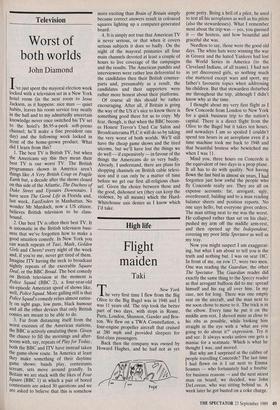Television
Worst of both worlds
John Diamond
I've just spent the mayoral election week locked with a television set in a New York hotel room (in the next room to Jesse Jackson, as it happens: nice man — quiet habits, leaves his room service tray neatly In the hall and to my admittedly uncertain knowledge never once switched his TV set to the hotel's $6.95-a-peek soft-porno channel; he'll make a fine president one day) and the following week locked in front of the home-grown product. What did I learn from this?
1. The best TV is British TV, but when the Americans say this they mean their best TV is our worst TV. The British programmes shown in America aren't things like A Very British Coup or Fragile Earth but, a decade after the shows closed on this side of the Atlantic, The Duchess of Duke Street and Upstairs Downstairs. I have seen The Good Life in Florida and, last week, EastEnders in Manhattan. No wonder Mr Murdoch, now a US citizen, believes British television to be class- bound.
2. Our best TV is often their best TV. It is axiomatic in the British television busi- ness that we've forgotten how to make a good situation comedy. In New York you can watch repeats of Taxi, Mash, Golden Girls and Cheers! every night of the week and, if you're me, never get tired of them. Imagine ITV having the neck to broadcast nightly repeats of the execrable Square Deal, or the BBC Bread. The best comedy on British television at the moment is Police Squad (BBC 2), a four-year-old six-episode American spoof of shows like, well, Police Squad. More galling still is that Police Squad's comedy relies almost entire- ly on sight gags, low puns, black humour and all the other devices that only British comics are meant to be able to do.
3. Far from distancing itself from the worst excesses of the American stations, the BBC is actively emulating them. Given the chance to fill the mornings and after- noons with, say, repeats of Play for Today, both the BBC and ITV have instead taken the game-show route. In America at least they make something of their daytime game shows: bands play, contestants scream, sets move around grandly. In Britain we are stuck with the likes of Four Square (BBC 1) in which a pair of bored contestants are asked 30 questions and we are asked to believe that this is somehow more exciting than Brain of Britain simply because correct answers result in coloured squares lighting up a computer-generated board.
29. It is simply not true that American TV is never serious, or that when it covers serious subjects it does so badly. On the night of the mayoral primaries all four main channels devoted at least a couple of hours to live coverage of the campaigns and the results. The American pundits and interviewers were rather less deferential to the candidates then their British counter- parts and, presumably as a result, the candidates and their supporters were rather more honest about their platforms.
Of course all this should be rather encouraging. After all, if Britain is going the way of the US it's nice to know there is something good there for us to copy. My fear, though, is that when the BBC becom- es Honest Trevor's Used Car Salon and Broadcasterama PLC it will do so by taking the very worst of both worlds. We'll still have the cheap game shows and the tired sitcoms, but we'll have lost the things we do well — if expensively — in favour of the things the Americans do so very badly. Already, I understand, there are plans for shopping channels on British cable televi- sion and it can only be a matter of time before we get our first all-religious chan- nel. Given the choice between these and the good, dishonest sex (they can keep the violence, by all means) which the Hurd- Whitehouse axis denies us I know which I'd take.


























































 Previous page
Previous page